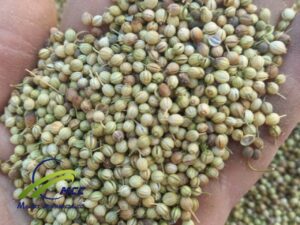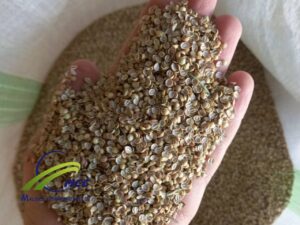Bulk Buying and Selling Coriander Seeds
Maleki Commercial, a leading manufacturer and wholesaler, specializes in the annual cultivation and supply of 3000 tons of coriander seeds. It is one of the largest suppliers of both Whole Coriander Seeds and Split (Roasted) Coriander Seeds in export, pharmaceutical, and food industry grades. Maleki Commercial is also a major exporter of this aromatic plant to Asian, African, and European countries.
Guaranteed quality with every purchase of our products. We are committed to providing the highest quality medicinal plants to exporters, importers, herbal traders, and bulk buyers. Our team of experts is ready to assist you with your bulk purchase needs. Contact our experts for bulk purchases.
The coriander plant, scientifically known as Coriandrum sativum, is considered one of the most aromatic medicinal plants. Besides, it is in high demand in the medicinal plant trade market for its import. This plant is used as a spice and as a raw material in various industries.
Botanical Characteristics
The coriander plant is an annual herb from the Apiaceae family, growing to a height of 30 to 60 cm. Its leaves are compound and have numerous incisions. The lower leaves are broader and larger, while the upper leaves are smaller and narrower. The flowers are either white or pink and appear in compound umbels.
The Coriander seeds, which are commercially significant parts of the plant, are spherical, measuring 3 to 5 mm in diameter, and vary in color from light brown to yellow. They have a highly aromatic flavor due to the volatile compounds present in them.
Geographical Distribution in Iran
Coriander grows both wild and cultivated in Iran. Various regions, particularly the provinces of Azerbaijan, Lorestan, Kermanshah, Hamadan, and Fars, are major centers for the cultivation and production of this plant in Iran.
It is grown both under rain-fed and irrigated conditions, alongside other crops. The temperate and relatively dry climate of Iran is suitable for the growth of coriander.
Geographical Distribution Worldwide
Coriander is cultivated in various regions around the world, including the Mediterranean, Western Asia, Africa, and Latin America. Major producers of coriander include Iran, Italy, India, Morocco, Egypt, Mexico, and Russia.
In Mediterranean countries, coriander is recognized as a valuable medicinal and culinary plant and is widely cultivated. In recent years, global demand for coriander seeds has increased due to their numerous medicinal and industrial properties.
Chemical Composition and Active Compounds
The coriander plant contains numerous chemical compounds, each contributing to its medicinal properties and industrial applications. The main compounds found in coriander seeds include:
- Volatile Oils: These constitute more than 1% of the dry weight of coriander seeds. The primary compound in these oils is linalool, which imparts a distinct aroma and flavor. Other compounds such as geraniol, camphene, and borneol are also present.
- Fatty Acids: The plant contains beneficial fatty acids such as palmitic acid, linoleic acid, and oleic acid, which are used in many medicinal and cosmetic products.
- Polyphenols and Flavonoids: These compounds act as strong antioxidants, helping to reduce inflammation and combat free radicals.
Mineral content per 100 g of Coriander Seeds is presented below;
| Minerals content (mg) | Minerals |
| 16.32 | Iron |
| 709 | Calcium |
| 330 | Magnesium |
| 1276 | Potassium |
| 35 | Sodium |
| 26.20 | Selenium |
| 409 | Phosphorus |
| 4.70 | Zinc |
Culinary Uses of Coriander Seeds
Coriander seeds are among the most commonly used spices in cooking. They are extensively utilized in Iranian, Indian, Arabic, and Mexican cuisines. Due to their distinctive aroma and flavor, coriander seeds are added to various dishes, soups, and sauces.
In Iranian cuisine, this aromatic plant is used as a seasoning in dishes such as abgoosht, ghormeh sabzi, and adasi. Additionally, coriander seed powder is employed to flavor pickles and preserves.
In Indian cooking, coriander is a key component in various spice blends, such as masala. Its mild aroma and flavor make it a balancing agent in many spicy dishes.
Application of Coriander Seed Essential Oil in Perfumery
The essential oil of coriander is highly regarded in the perfume industry due to its mild, sweet, and floral scent. The aroma of coriander seeds, attributed to compounds like linalool, has calming and uplifting properties. In perfume formulations, coriander essential oil is often used as a middle and base note.
The inclusion of coriander essential oil in fragrances imparts a sense of freshness and naturalness, making it particularly popular in the creation of herbal and oriental perfumes.
Pharmacological and Therapeutic Properties
Coriander seeds are widely used in pharmaceuticals due to their numerous medicinal properties. Some of the key therapeutic benefits of coriander seeds include:
Anti-Inflammatory
The polyphenolic and flavonoid compounds in coriander act as anti-inflammatory agents, helping to reduce both internal and external inflammation.
Antimicrobial and Antibacterial
The essential oil of coriander possesses strong antimicrobial properties and can aid in combating bacteria and viruses. These properties are utilized in the development of antimicrobial and disinfectant medications.
Digestive Health
Coriander aids in improving digestion, reducing bloating, and alleviating stomach gas. It is thus commonly included in herbal remedies for digestive issues.
Blood Sugar Control
Studies have shown that coriander can help lower blood sugar levels. It promotes insulin secretion and enhances cellular sensitivity to insulin, making it a natural supplement for diabetes management.
Antioxidant
Due to its strong antioxidant properties, coriander helps to mitigate the negative effects of free radicals in the body and prevent cellular damage. This property is beneficial in preventing chronic diseases and premature aging.
Sleep Improvement and Anxiety Reduction
The calming properties of coriander essential oil can improve sleep and reduce stress and anxiety. Thus, it is used in traditional medicine as a soothing remedy.
Others have read the article titled Manufacturer, Supplier, and wholesaler of coriander Seeds.
Coriander Seed Names in Different Languages
- English: Coriander seeds
- Arabic: بذور الكزبرة
- Russian: Семена кориандра (Semena koriandra)
- Japanese: コリアンダーシード (Koriandā shīdo)
- Chinese: 芫荽籽 (Yán suī zǐ)
- Spanish: Semillas de cilantro
- German: Koriandersamen
- Belgian (Dutch): Korianderzaad
- Dutch: Korianderzaa
- Pakistani (Urdu): دھنیا کے بیج (Dhaniya ke beej)
- Malaysian: Biji ketumbar
- Indonesian: Biji ketumbar
- Korean: 고수 씨앗 (Gosu ssiyat)
Export and Import Statistics for Coriander Seeds in 2023
In 2023, global coriander seed exports saw a significant increase. India, as the largest exporter of this plant in the world, led the global market with exports valued at approximately $95.93 million, capturing over 54.65% of the global export share.
This export volume represented an 84% increase compared to the previous year. Italy and Bulgaria followed, with exports valued at $27.54 million and $15.51 million, ranked second and third, respectively.
Conversely, imports of coriander seeds in 2023 experienced a decline. For instance, in December 2023, India’s coriander seed imports reached approximately 4514 tons, reflecting a 39% decrease from the previous month.
This downward trend was also evident in the annual import statistics, with India’s coriander seed imports from January to December 2023 totaling around 28000 tons, a 16% decrease compared to the previous year.
Exports from countries such as Egypt and Argentina also showed fluctuations in 2023. For example, Egypt’s exports grew by 975% to about $3.45 million, while Argentina’s exports decreased by 35% to $3.14 million.
Overall, the market for coriander seeds in 2023 experienced considerable volatility, influenced by factors such as production, demand, and climatic changes.
Iran’s precise share of coriander seed exports for 2023 has not yet been clearly and officially documented in public sources. However, data from 2022 indicate that Iran earned approximately $10.7 million from coriander seed exports, ranking sixth globally.
While comprehensive reports for 2023 are not yet available, it is expected that Iran’s exports will remain at a high level given the trends in global demand and export patterns.
Coriander Seed Wholesale (Bulk)
For purchasing Whole and Split (Roasted) Coriander Seeds in export, pharmaceutical, and mid-quality grades, with sorting percentages of 50% to 99%, and standard packaging with the required weight, contact our experts for a hassle-free purchase with guaranteed quality.
Largest Supplier and Exporter of Whole and Split (Roasted) Coriander Seeds
Maleki Commercial, with an annual supply of over 3000 tons of coriander seeds, is the largest supplier and exporter of this aromatic plant in Iran and Asia. Traders, importers, and exporters can place orders throughout the year and receive the plant in various qualities and sorts, with quality assurance, and packaging options based on the Incoterms EXW, CIF, CFR, FOB, FCA, anywhere in the world. For purchasing this aromatic plant, please contact our experts.


